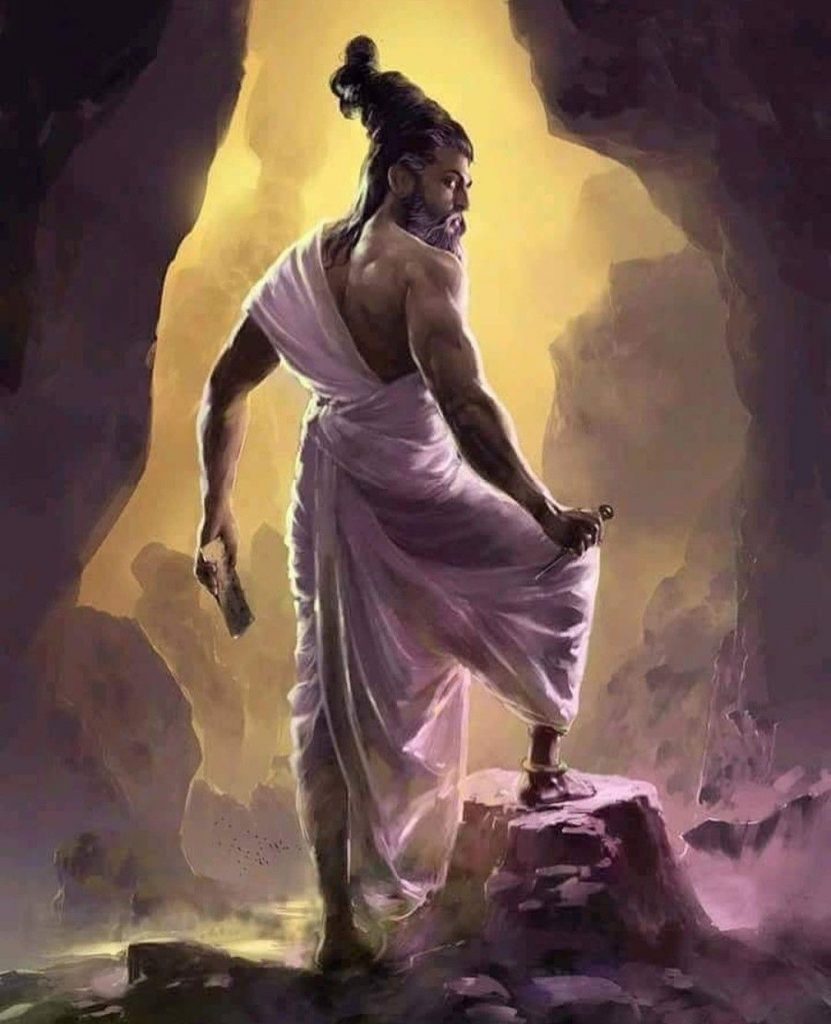
எண்ணித் துணிகக் கருமம் துணிந்தபின்
எண்ணுவம் என்பது இழுக்கு
enni thuniga karumam thuninthapin
ennuvam enbathu izhukku (467)
कार्यनिर्वहणोपायमादौ ज्ञात्वा क्रियां कुरु ।
प्रविश्य कार्ये नोपायचिन्तनं कार्यसाधकम् ॥ (४६७)
होना प्रवृत्त कर्म में, करके सोच-विचार ।
‘हो कर प्रवृत्त सोच लें’, है यह गलत विचार ॥ (४६७)
ಆಲೋಚನೆ ಮಾಡಿದ ಮೇಲೇ ಕೆಲಸವನ್ನು ಕೈಗೊಳ್ಳುವ ನಿರ್ಧಾರಕ್ಕೆ ಬರಬೇಕು. ಮೊದಲೇ ಕೆಲಸ ಮಾಡಲು ನಿರ್ಧರಿಸಿ ಆಮೇಲೆ ಆ ಬಗ್ಗೆ ‘ಆಲೋಚನೆ ಮಾಡೋಣ’ ಎನ್ನುವುದು ದೋಷವೆನಿಸುವುದು. (೪೬೭)
Überlege und wage eine Tai- nach der Tat lu überlegen ist Schande.
Think wisely before you undertake an action. To start to think after commencing a task is disgraceful.
The Tirukkural (திருக்குறள்) is considered one the greatest works on dharma, not just in India, but in the world. Tiru is an honorific, like श्री (Shree) in Sanskrit, and Kural means concise. The Tirukkural is a consise, yet elaborate work, spanning 133 chapters of 10 couplets each. The couplets are in the Kural vemba metre – 2 lines with four words in line 1 and three words in line 2.
The Tirukkural has both structural meaning (when taken in context of the frame chapters) and moral meanings when taken in isolation.
The work comprises three parts:
- Book I – Aṟam (அறம்): Book of Dharma, dealing with moral values of an individual and essentials of yoga philosophy (Chapters 1-38)
- Book II – Poruḷ (பொருள்): Book of Artha, dealing with socio-economic values, polity, society and administration (Chapters 39-108)
- Book III – Inbam (இன்பம்): Book of Kama, dealing with psychological values and love (Chapters 109-133)
It;’s structure reflects the पुरुषार्थ (Puruṣārthas) or pursuits of human life, namely Dharma, Artha, Kama, and a result of the right pursuit of these three – Moksha, or liberation.
While we do frequently quote other towering works originating from India, such as the Srimad Bhagwad Gita and the Panchatantra, the Tirukkural has not got the pan-India attention that it deserves.
And so, here is a new series of mine – an attempt to bring to you the wisdom of Tiruvalluvar, as it applies to today’s world, to our professional and personal lives, management and mindfulness.
This series will not be an exhaustive commentary on the complete scripture – I will pick a few verses that touched me, and string them together in the hope that it encourages you to dig deeper. The essence of Tirukkural can be best understood in Tamil, but my own knowledge of this classical language is minimal, and hence I have to rely on multiple translations. However, I will try to source the audio files as well, so that you can hear as well as read the couplets.
I have also included Sanskrit, Hindi, Kannada and German translations – hope they convey the message in a language that you best understand. As for me, I am trying to learn from as many sources as possible, and share those sources with you too. As Tiruvalluvar said –
தொட்டனைத் தூறும் மணற்கேணி மாந்தர்க்குக்
கற்றனைத் தூறும் அறிவு.
thottanaithu oorum manarkaeni maantharku
kattraianthu oorum arivu (396)
विद्यभ्यासानुसारेण नृणां ज्ञानां प्रवर्धते ।
खननानुगुणं तोयं वर्धते सैकते यथा ॥ (३९६)
जितना खोदो पुलिन में, उतना नीर-निकास ।
जितना शिक्षित नर बने, उतना बुद्धि-विकास ॥ (३९६)
ಮಳಲು ತೋಡಿದ ಪ್ರಮಾಣಕ್ಕೆ ಬಾವಿಯಲ್ಲಿ ನೀರು ತುಂಬುವಂತೆ ಮನುಷ್ಯರು ಕಲಿತ ವಿದ್ಯೆಯ ಪ್ರಮಾಣಕ್ಕೆ ಅರಿದು ಸಂಪಾದಿಸುತ್ತಾರೆ (೩೯೬)
Dem Graben einer Quelle im Sand gemäß quillt Wasser hervor – ihrem Lernen gemäß nimmt die Erkenntnis der Leute zu.
Water will flow from a well in the sand in proportion to the depth to which it is dug, and knowledge will flow from a man in proportion to his learning.
Happy reading!
